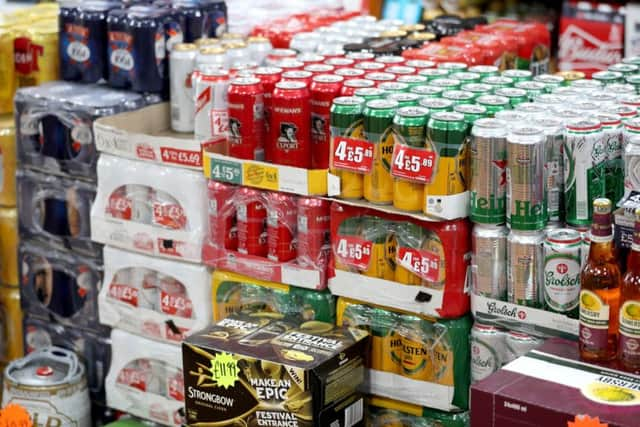Minimum unit pricing for alcohol: Everything you need to know
- What is Minimum unit pricing?
Minimum unit pricing, or MUP, simply sets a floor price for a unit of alcohol, meaning it cannot legally be sold for less than that. The more alcohol in a drink, the more expensive it will be.
- Why does the price of alcohol matter?


Health campaigners argue when the price of alcohol goes down, consumption of alcohol goes up. The more affordable drink becomes, the more people use it, and the more harm society experiences because of it.
- What exactly is being introduced?
Advertisement
Hide AdAdvertisement
Hide AdThe Alcohol (Minimum Pricing) (Scotland) Act was passed by MSPs at Holyrood in 2012. The Scottish Government confirmed in February this year it would set the baseline price for alcohol at 50p a unit. Ministers believe MUP will mostly affect the cheap white ciders and value spirits with high alcohol content that tend to be favoured by harmful drinkers. A 50p minimum price means a 70cl bottle of whisky could not be sold for less than £14. It takes the cost of a 70cl bottle of 37.5% vodka to no less than £13.13, four 440ml cans of 9% lager increase to a minimum of £7.92 and a 75cl bottle of 12.5% wine can be sold for no less than £4.69.


- What’s wrong with bringing in other measures instead?
Ministers insist Scotland’s alcohol problem is so significant that “ground breaking” measures are needed. They say that, given the link between consumption and harm and evidence that affordability is one of the drivers of increased consumption, addressing price is an important element of any long-term strategy. Ministers believe there is strong international evidence that tackling price, as part of a package of measures, can help reduce alcohol consumption.
- Just how serious is Scotland’s relationship with the bottle?
The Scottish Government argues the nation’s relationship with alcohol has become imbalanced. Almost a fifth more alcohol is sold per adult in Scotland than in England and Wales, and statistics show more than 40% of prisoners were drunk at the time of their offence. On average, alcohol misuse causes about 697 hospital admissions and 22 deaths a week and it costs Scotland £3.6 billion each year, or £900 for every adult, ministers say.
- What impact could MUP have on harm reduction?
Ministers say it means less money will have to be spent dealing with the consequences of alcohol misuse. They point to research suggesting the move is expected to save 392 lives in the first five years of implementation.
- The legislation was passed in 2012, so why has it taken Scotland so long to have minimum pricing for alcohol?
Implementation of the law was held up due to a long-running legal challenge from alcohol industry bodies, led by the Scotch Whisky Association (SWA). Their challenge was heard at various levels at Scotland’s highest civil court, the Court of Session, and went to the Court of Justice of the European Union. It was only after that the hearings moved to the UK Supreme Court, which rejected the industry challenge.
- What are the arguments against MUP?
The Scotch Whisky Association (SWA) believes it will not tackle alcohol misuse effectively and says there is no evidence MUP is effective in reducing alcohol-related harm. It believes the measure contravenes EU trading rules. It claims MUP will set a precedent for “equally ineffective and illegal measures” by other countries which could severely damage the Scotch Whisky industry’s export markets and the Scottish economy. The body says it is a regressive policy that hits responsible drinkers, in particular those with the lowest incomes. They agree there is a problem with alcohol misuse but say alcohol-related harm in Scotland has declined in recent years. In addition, existing laws on under-age sales and sales to drunk people are not fully and effectively applied at the moment, it argues.
